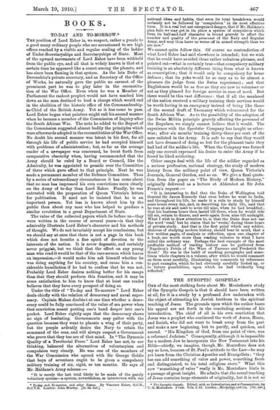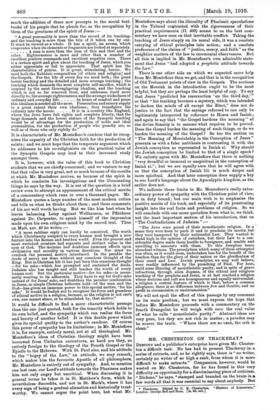THE SYNOPTIC GOSPELS.*
ONE of the most striking facts about Mr. Montefiore's study of the Synoptic Gospels is that it should have, been written at all, for it is a study by a professed Jew undertaken with the object of attracting his Jewish brethren to the spiritual teaching of Jesus. The grounds upon which the author bases his appeal are set forth in the concluding sections of his introduction. The chief of all is his own conviction that Jesus was a prophet who continued the work of Amos, Hosea, and Isaiah, who did not want to break away from the past and make a new beginning, but to purify, and quicken, and amend. " His Kingdom of God, from one point of view, was a reformed Judaism." Consequently. although it is impossible for a modern Jew to incorporate the New Testament into his Bible—chiefly, we imagine, though.Mr. Montefiore does not say so here, because of St. Paul's attitude to the Law—he may yet learn from the Christian Apostles and Evangelists : "they too can add something of value and power, something fresh and distinguished, to his total religions store." What this new " something of value " really is Mr. Montefiore hints in a passage of great insight. He admits that themoral teaching of Jesus contains large elements of originality but it is not so • The Synoptic Gospels., Edited, with an Introdtirticitteadei Oonsoseritary, C. (le Idontettore. 3 vols. yols. 1.-u. London ,..nrAcwititt.And [18.. set-4,
much the addition of these new precepts to the moral text- books' of his people that be pleads for, as the recognition by them of the greatness of the spirit of Jesus :— " A great personality is more than the record of its teaching, and the teaching is more than the bits of it taken one by one. It must be viewed as a 'whole. It has a spirit, an aroma, which evaporates when its elements or fragments are looked at separately.
A man is more than the sum of this and that and the other. Righteousness is more and other than a number of excellent positive commands and excellent negative ones. There is a certain spirit and glow about the teaching of Jesus, which you either appreciate or fail to appreciate. That spirit has the characteristics of genius. It is great, stimulating, heroic. We need both the Rabbinic compendium [of ethics and religion] and the Gospels. For the life of every day we need both ; the great heroic teaching and the detailed and more average teaching ; the teaching which demands the most complete self-sacrifice, which is inspired by the most thoroughgoing idealism, and the teaching which is not so far removed from, and addresses itself more directly to, the average righteousness and the average wickedness of
ordinary and everyday life In hours of comfort and peace this idealism is needed all the more Persecution and misery supply to a great extent their own idealisms ; they transfigure the ordinary into the heroic It is in a country like England, where the Jews have full rights and complete liberty, that the large demands and the heroic stature of the Synoptic teaching would be of advantage for the production of noble and ideal personalities, for the production of people who grandly are, as well as of those who only rightly do."
It is characteristic of Mr. Montefiore's candour that he recog- nises the capacity of the Christian faith for the production of saints ; and,we must hope that the temperate argument which he addresses to his co-religionists on the practical value of the Synoptic Gospels may lead to their increased study amongst them.
It is, however, with the value of this book to Christian students that we are chiefly concerned; and we venture to say that that value is very great, not so much because of the results at which Mr. Montefiore arrives, as because of the spirit in which he conducts his investigations and the illuminating things he says by the way. It is out of the question in a brief review even to attempt an appraisement of the critical merits of a commentary which runs to over a thousand pages. Mr. Montefiore quotes a large number of the most modern critics and tells us what he thinks about them ; and these comments of his are well worth having. But we like him best when he leaves balancing Loisy against Wellhausen, or Pfleiderer against Dr. Carpenter, to speak himself of the impression, made upon his own religious mind by the sacred text. Thus on Matt. xxv. 40 he writes :— "A more sublime reply can hardly be conceived. The worth which Christianity assigned to every human soul brought a new feature into the Roman and heathen world. Even the poorest and most wretched creature had separate and distinct value in the eyes of God. The doctrine had doubtless immense effects upon civilization and morality in various directions. Nor must we overlook the personal motive introduced. In the parable the deeds of mercy are done without any conscious thought of the Ring. But in Christian life it has just been this conscious thought —for his sake—which has prompted and sustained the deeds. Judaism also has taught and still teaches the worth of every human soul. But the particular motive—for his sake—is neces- sarily wanting to its adherents. They have to say for God's sake instead of for Jesus' sake, and doubtless the peculiar combination in Jesus, as simple Christian believers hold—of the man and the God—has given an immense power to this special motive, for his sake.' It would be foolish not to recognise the force and grandeur of ethical motive in a religion, because, as the religion is not one's own, one cannot share, or be stimulated by, that motive."
It would be difficult to find a more characteristic passage than.,the one just quoted, both for the tenacity which holds to its own belief, and the sympathy which can realise the force and beauty, of another belief. It is this double power which gives its special quality to the author's candour. Of course this power of, sympathy has its limitations ; in Mr. Montefiore it is, for example, entirely moral, not at all theological. Mr. Montefiore's ideas of Christian theology might have been borrowed from Unitarian caricatures, so hard are they, so entirely foreign to the theology of the Fourth Gospel or the Epistle to the Hebrews. With St. Paul also, and his attitude to the "bogey of the Law," an attitude, we may remark, which makes him the favourite Apostle of all philosophers, Mr. Montefiore is entirely out of sympathy. And, to mention one last case, our Lord's attitude towards the Pharisees makes him not only angry but uncritical. When discussing it in general terms he takes it in St. Matthew's form, which he nevertheless discredits, and not in St. Mark's, where it has every sign of being a gradual alienation and historically trust- worthy. We cannot argue the point here, but what Mr. Montefiore says about the liberality of Pharisaic speculations in the Talmud contrasted with the rigorousness of their practical requirements (IL 499) seems to us the best com-
mentary we have seen on that inevitable conilicb. Taking the
teaching of Jesus simply on its moral side, it was a resolute carrying of ethical principles into action; and a resolute preference of the claims of "justice, mercy, and faith" as the weightier matters of the law to ceremonial observances. But
all this is implied in Mr. Montefiore's own admirable state- ment that Jesus "had adopted a prophetic attitude towards the Law."
There is one other side on which we expected more help from Mr. Montefiore than we get, and that is in the recognition of. Old Testament points of view in the Gospels. The sections on the Messiah in the introduction ought to be the most helpful, but they are perhaps the least helpful of any. To say
that Jesus "predicted his resurrection ' on the third day,' " or that " his teaching becomes a mystery, which was intended
to darken the minds of all except the Elect," does not do justice to the fact that the sayings referred to can only be
legitimately interpreted by reference to Hosea and Isaiah ; and again to say that " the Gospel hardens the meaning " of
the divine Sonship is to assume what requires to be proved. Does the Gospel harden the meaning of such things, or do we harden the meaning of the Gospel ? So too the section on
" The Meaning of Messiahship in the Conception of Jesus " presents us with a false antithesis in contrasting it with the Jewish conception as represented in Isaiah xi. Why should the Jewish conception be limited to that of a single epoch P We entirely agree with Mr. Montefiore that there is nothing
"very dreadful or immoral or unspiritual in the conception of Isaiah xi." ; but we are equally sure that he will agree with us that the conception of Isaiah liii. is much deeper and more spiritual. And that later conception does supply a ley to our Lord's language about the Apocalyptic kingdom, as the earlier does not.
We indicate these limits to Mr. Montefiore's really extra- ordinary power of sympathy with the Christian point of view, as in duty bound ; but our main wish is to emphasise the positive merits of his book, and especially of its penetrating insight into the real facts and problems of religion. So we will conclude with one more quotation from what is, we think, not the least important section of his introduction, that on "The Contradictions of Judaism " "The Jews were proud of their monotheistic religion. In a sense they were keen to push it and to proclaim its merits, but they were hampered by their nationalist Law. They wanted to stand high in the opinion of outsiders, but their Law to a con- siderable degree made them hostile to foreigners, and unable and unwilling to associate with them. To this Josephus bears abundant witness. The proselytism which many of them attempted was often, as it would seem, undertaken less for the benefit of the heathen than for the glory of their nation or the glorification of their creed and Law. Jewish proselytes, we may well believe, were readily influenced by the preaching of Paul. For here, amid some blurring of monotheistic purity, and in spite of grave infractions, through alien dogmas, of the ethical and religious teaching of the prophets and Jesus, is at last reached a religion where doctrine and cult are homogeneous and equally universalist, a religion a central feature of which is that, before a common allegiance, there is no difference between Jew and Gentile, and no profit in circumcision or uncircumcision."
We will not spoil the effect of this passage by any comment on its main position; but we must express the hope that before Mr. Montefiore proceeds with a commentary on the fourth Evangelist he will weigh with care the real value of what he calls "monotheistic purity." Abstract ideas are very pure, but they are not rich in matter; a paradox may be nearer the truth. " Where there are no oxen, the crib is clean."











































 Previous page
Previous page